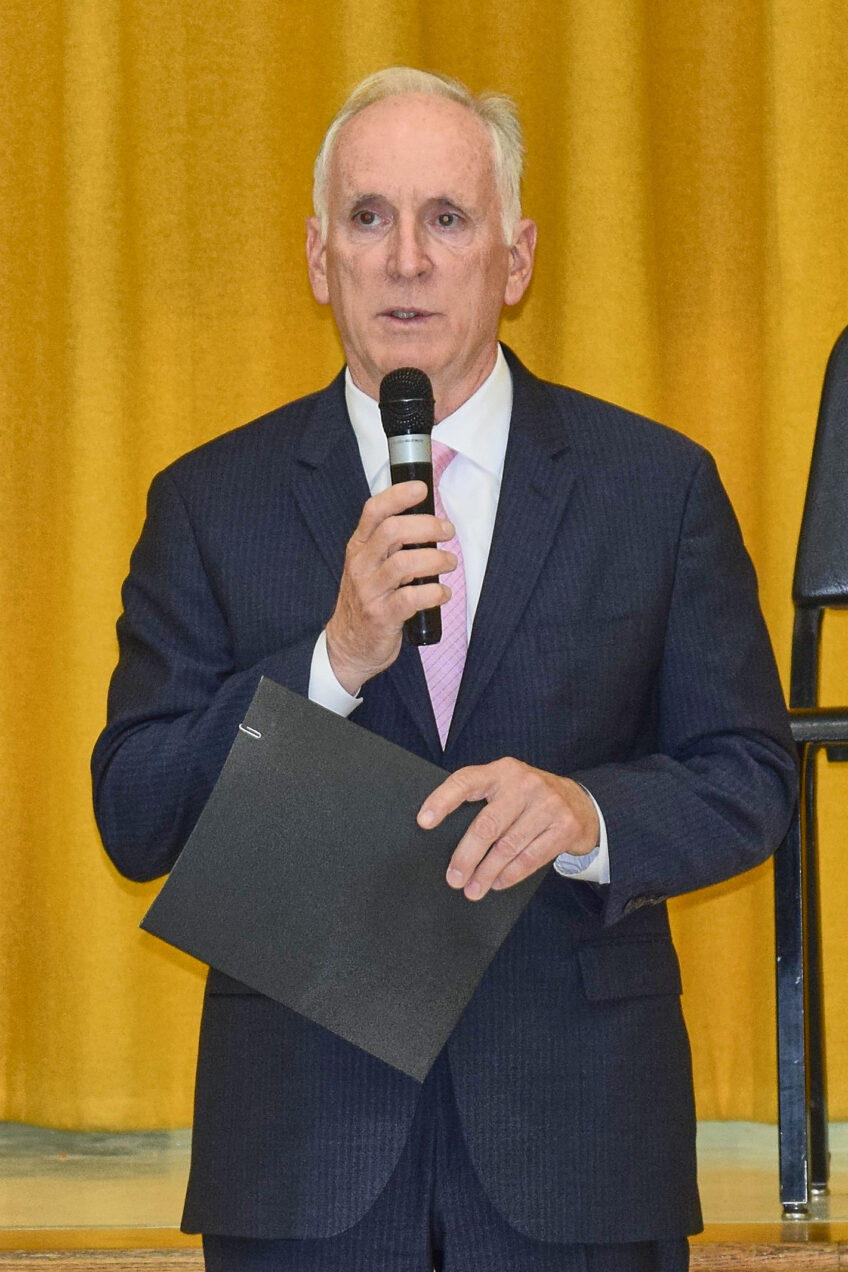On May 2 Greenbelt Middle School hosted the District 22 discussion on the 2023 legislative session of the Maryland State Assembly with District 22 Senator Alonzo Washington and Delegates Nicole Williams, Anne Healey and Ashanti Martinez. Approximately 65 people attended from across the district, which includes Greenbelt, Hyattsville, New Carrollton, Berwyn Heights, East Riverdale and Riverdale Park. A broad range of legislative bills passed by both the Maryland State Senate and Maryland House of Delegates were covered, but what primarily interested the audience were transportation and cannabis (marijuana) issues.
Transportation Speakers
Maryland Secretary of Transportation Paul Wiedefeld spoke about projects such as the Penn Line tunnel, the New Carrollton Metro Station and the maglev train, which is currently going through environmental review. Depending on that review, maglev will either proceed or be cancelled, but nothing will be known until after the review is finished.
Tim Smith, currently the administrator for the Maryland Department of Transportation (MDOT) State Highway Administration (SHA), spoke about current projects including the road widening near Md. 410. Smith was accompanied by Derek Gunn, transportation engineer manager.
Matthew Pollack, executive director at Maryland Transit Administration, spoke about the Purple Line, a 16.2-mile light-rail line being built to link Bethesda, Silver Spring, College Park and New Carrollton, which has been long awaited. Slated to open in late 2026, the line will also enable riders to move between the Maryland sections of the Red, Green and Orange Metro lines without riding into Washington, and between all three lines of the MARC commuter rail system.
FBI and Transportation
Washington reiterated county and state leaders’ determination that the FBI headquarters should not be in Springfield, Va. Pointing out the disproportionate investment in Virginia, “They knew we were going to win,” said Washington, who again noted that “they’ve moved the needle” by the late addition of proximity to Quantico as a consideration in site selection. Washington highlighted that Maryland has put $100 million in the budget to invest in the FBI relocation and the community around it, whether that’s Greenbelt or Landover. “That’s just the start,” said Washington, who emphasized they are “really serious.” The FBI’s relocation would bring more federal jobs to Prince George’s County and is an issue of equity of investment for many (see FBI Headquarters: Politicians Rally at Metro Station To Challenge Criteria Changes in the November 10, 2022 issue of the News Review).
Mayor Emmett Jordan noted that some transportation issues may need resolution, especially if the FBI relocated to Greenbelt. Bus service between the Greenbelt Metro Station and Baltimore Washington International (BWI) airport should be resumed, he suggested, and improved service on the MARC trains would make a trip between Washington and Baltimore as efficient as the proposed maglev. These suggestions drew applause from the audience.
Greenbelt Road
Katrina Dodro, mayor elect of New Carrollton, spoke about driving her daughter to school at the Dora Kennedy French Immersion School in Greenbelt and the difficulty in navigating the short traffic light at Greenbelt Road and Kenilworth Avenue. Gunn noted that MDOT was aware of the problem.
Biking and Walking
Jeremiah Lowery, advocacy director of the Washington Area Bicycle Association, spoke from the audience about alternatives to automobile transportation for people who walk, ride bikes and take buses. Lowery pointed to Kenilworth and Old Baltimore Pike as dangerous to bikers. Smith suggested contacting MDOT’s District 3 office, which is in Greenbelt, to report unsafe driving issues and litter issues. The District 3 website (roads.maryland.gov/mdotsha/pages/districts.aspx?did=d3) instructs residents to: “Report highway emergencies, such as traffic signal outages or sinkholes to our Statewide Operations Center toll-free at 1-800-543-2515 or locally at 410-582-5650. For routine service requests involving a state route, the most effective method of contact is MDOT SHA’s Service Request form.”
Marijuana Concerns
Audience member Jemeel Aalim-Johnson spoke about the recent bill concerning recreational marijuana use passed by the Maryland State Assembly (use of marijuana for medical purposes has been in effect since June 1, 2014). Aalim-Johnson was concerned that marijuana dispensaries would degrade the community as liquor stores have in minority communities. His concerns resonated with the audience and were met with further comments and applause. Delegate Nicole Williams spoke about the provisions in the bill to prevent “clustering” of dispensaries and over-saturation. The bill also tries to keep the sales tax as low as possible in the hope of eradicating the illegal sale of marijuana.
Delegate Healey noted that a majority of Marylanders had already voted for the ballot issue that legalized marijuana, which goes into effect on July 1. This marijuana bill is an attempt to ensure that Maryland profits from legalization in a fair, safe way. Localities are not allowed to prohibit the sale of marijuana; the dispensaries have to be everywhere and not clustered. Williams said the first round of licenses will consider equity, to benefit communities most impacted by its criminalization, and will go to graduates from Historically Black Colleges and Universities, for example. An equity fund will be available to those who wish to open a business.

